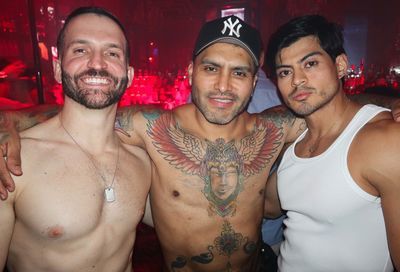Legal Leadership
Lambda Legal's Kevin Cathcart has overseen two decades of enormous change, and looks forward to the years to come
Lambda Legal Defense and Education Fund’s executive director, Kevin Cathcart, marvels at the changes in the law and the legal world since he began running the nation’s largest LGBT legal organization in 1992.
”I think people that are newer to the legal profession today can’t even imagine,” Cathcart, who joined Lambda 20 years ago this month, says at a coffee shop in D.C. before a May 21 fundraiser celebrating his anniversary with the group. At the event, he noted that it was a celebration, not a wake, and says he no plans other than to stay with the organization.

Kevin Cathcart of Lambda Legal
(Photo by Todd Franson)
”I tell stories and I sound like I’m 5,000 years old, because the climate inside of law firms is so different today. The notion that partners weren’t out 10 or 20 years ago, that firms wouldn’t co-counsel cases with a group like Lambda.”
His work with LGBT nonprofits didn’t begin at the New York-based group. He started eight years earlier at the Boston-based Gay & Lesbian Advocates & Defenders (GLAD).
”In 1984, I became the executive director of GLAD … and we had an annual budget of $30,000,” he says. Looking at the change since then, he notes, ”It was harder to raise $30,000 in New England in 1984 than it is to raise $13 million for Lambda Legal today – and I’m not gonna say that it’s easy, because if it was easy we’d have a budget of $15 million, but still.”
It wasn’t only the money. ”When I went to New York in 1992 to Lambda Legal, you could still count the number of openly gay partners at major law firms in New York City on your fingers,” he says. ”And then there would also be some debate. It was like, ‘Well, they’re sort of out, but don’t call them at the office.”’
It’s the same with the cases – once brought primarily by GLAD, Lambda Legal, the ACLU Gay and Lesbian Rights Project (now, the LGBT Project) and the National Center for Lesbian Rights, and now brought by those groups, several others and individuals.
”When I went to Lambda Legal in 1992, you could still keep track of every case that was going on,” he says. ”Even two or three years ago, who would have predicted how many DOMA challenges there are now? Who actually knows how many DOMA challenges there are?
”So, we’re talking about 20 years ago when you could know every lesbian and gay case, because I’m not even going to pretend – there wasn’t an LGBT docket in those days. It was a gay and lesbian and HIV docket in those days.”
”[The] total today,” he says of DOMA challenges alone, ”is bigger than the total docket 20 years ago on everything.”
With all this progress, though, he does acknowledge that there is more that could be done. At Lambda Legal, he says, ”We have one person who does trans work full time, we have one person who does HIV work full time. Most of our people are generalists – that doesn’t mean only one person is doing HIV or trans work – because other people are doing pieces, but … [we] have 18 lawyers in the legal department covering, basically, the country.
”Shouldn’t we have more people doing trans work? Sure. Shouldn’t we have more people doing youth and schools work? Of course. … Shouldn’t we have more people doing HIV work? The epidemic is still completely out of control in this country. Shouldn’t we – fill it in.”
But, he says, limited resources limit their and other groups’ work. The empowering point, as he sees it, is how well advances are going whenever they are attempted: ”The amazing thing right now is how much opportunity there is in all of these areas to make changes.”
Looking back over his nearly 30 years at the helm of two of the LGBT legal organizations – since before the Supreme Court upheld sodomy laws in Bowers v. Hardwick in 1986 – he says of the case that reversed that decision, ”It’s really hard to know when ‘it’ happened, but I don’t think we can ever overestimate the role that Lawrence [v. Texas] played in ratcheting up … the country’s evolution … on gay issues.
Calling Bowers an ”enormous sort of kick in the gut to everyone in the community,” he says of the 2003 decision in Lawrence, a Lambda Legal case, ”It was amazing to see how much that meant to people when that changed.”
”When the historians look back on this and sort it all out,” Cathcart says that he thinks they will write about ”how the Lawrence decision and the country’s reaction and the way it was talked about in the press was the turning point.
”It was an amazing thing.”
Support Metro Weekly’s Journalism
These are challenging times for news organizations. And yet it’s crucial we stay active and provide vital resources and information to both our local readers and the world. So won’t you please take a moment and consider supporting Metro Weekly with a membership? For as little as $5 a month, you can help ensure Metro Weekly magazine and MetroWeekly.com remain free, viable resources as we provide the best, most diverse, culturally-resonant LGBTQ coverage in both the D.C. region and around the world. Memberships come with exclusive perks and discounts, your own personal digital delivery of each week’s magazine (and an archive), access to our Member's Lounge when it launches this fall, and exclusive members-only items like Metro Weekly Membership Mugs and Tote Bags! Check out all our membership levels here and please join us today!




















